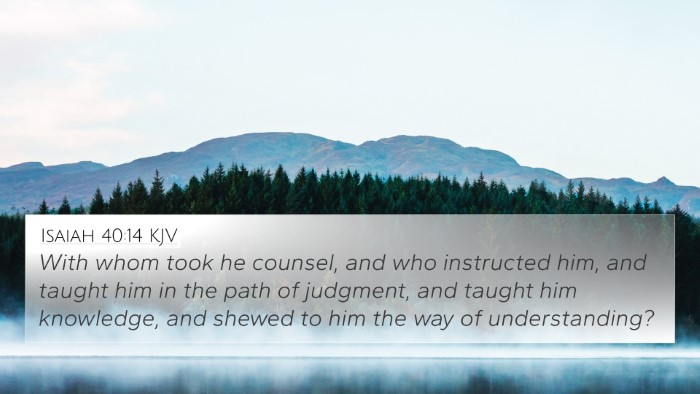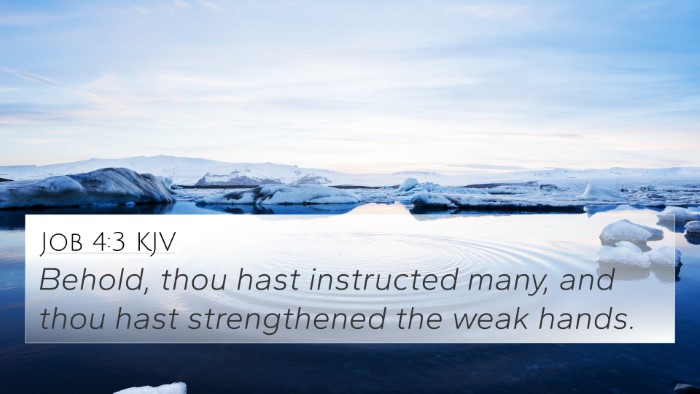Old Testament
Genesis Exodus Leviticus Numbers Deuteronomy Joshua Judges Ruth 1 Samuel 2 Samuel 1 Kings 2 Kings 1 Chronicles 2 Chronicles Ezra Nehemiah Esther Job Psalms Proverbs Ecclesiastes Song of Solomon Isaiah Jeremiah Lamentations Ezekiel Daniel Hosea Joel Amos Obadiah Jonah Micah Nahum Habakkuk Zephaniah Haggai Zechariah MalachiJob 26:2 Similar Verses
Job 26:2 Cross References
How hast thou helped him that is without power? how savest thou the arm that hath no strength?
Uncover the Rich Themes and Topics of This Bible Verse
Listed below are the Bible themes associated with Job 26:2. We invite you to explore each theme to gain deeper insights into the Scriptures.
Job 26:2 Cross Reference Verses
This section features a detailed cross-reference designed to enrich your understanding of the Scriptures. Below, you will find carefully selected verses that echo the themes and teachings related to Job 26:2 KJV. Click on any image to explore detailed analyses of related Bible verses and uncover deeper theological insights.

1 Kings 18:27 (KJV) »
And it came to pass at noon, that Elijah mocked them, and said, Cry aloud: for he is a god; either he is talking, or he is pursuing, or he is in a journey, or peradventure he sleepeth, and must be awaked.

Isaiah 41:5 (KJV) »
The isles saw it, and feared; the ends of the earth were afraid, drew near, and came.

Isaiah 40:14 (KJV) »
With whom took he counsel, and who instructed him, and taught him in the path of judgment, and taught him knowledge, and shewed to him the way of understanding?

Psalms 71:9 (KJV) »
Cast me not off in the time of old age; forsake me not when my strength faileth.

Job 16:4 (KJV) »
I also could speak as ye do: if your soul were in my soul's stead, I could heap up words against you, and shake mine head at you.
Job 26:2 Verse Analysis and Similar Verses
Meaning and Interpretation of Job 26:2
Job 26:2 reads, "How hast thou helped him that is without power? how savest thou the arm that hath no strength?" In this verse, Job is addressing his friend Eliphaz, challenging him on the nature of help and strength in the face of human suffering.
Contextual Overview
In examining this verse, it is essential to understand the context of the Book of Job. Throughout the text, Job suffers immense loss and physical affliction, and his friends come to offer counsel that ultimately adds to his distress. Job's own declarations reflect his struggle with the apparent silence of God in his adversity.
Key Themes in Job 26:2
- The human condition of vulnerability: Job emphasizes the plight of those who are powerless, revealing a deep understanding of human vulnerability.
- Moral questioning: Job raises significant questions about the effectiveness and nature of the help and advice provided by his friends, suggesting they lack true insight.
- The nature of divine help: The verse implies a contrast between human limitations and the possibility of divine assistance, a recurring theme throughout the Scriptures.
Commentary Insights
Matthew Henry
Matthew Henry notes that Job's question reflects a deep sense of irony and a challenge to his friends' claims of wisdom. He points out that strength and honor belong to God alone, and it is indeed He who provides sustenance to the weak. Henry emphasizes that true support must come from God, as human efforts are often insufficient.
Albert Barnes
Albert Barnes focuses on the rhetorical nature of Job's questions, highlighting the futility of claiming to offer assistance when one lacks the means to effect change. He underlines Job's assertion that human intervention must be underpinned by divine power.
Adam Clarke
Adam Clarke elaborates on the intricate relationship between human frailty and divine potency. He interprets Job's inquiry as a profound acknowledgment of dependence on God, making it clear that any claims of superiority from his friends are misplaced when considering the vastness of God's capabilities.
Cross-References Related to Job 26:2
- Psalm 10:17: "O Lord, thou hast heard the desire of the humble: thou wilt prepare their heart, thou wilt cause thine ear to hear;" - Emphasizes God's attentiveness to the plight of the needy.
- Isaiah 40:29: "He giveth power to the faint; and to them that have no might he increaseth strength." - Directly connects with the theme of strength and support.
- Matthew 11:28: "Come unto me, all ye that labour and are heavy laden, and I will give you rest." - Invites the weak to seek divine help.
- Romans 5:6: "For when we were yet without strength, in due time Christ died for the ungodly." - Highlights the human condition of powerlessness redeemed through divine action.
- 2 Corinthians 12:9: "My grace is sufficient for thee: for my strength is made perfect in weakness." - Stresses the potency of divine strength in human weakness.
- Psalms 27:10: "When my father and my mother forsake me, then the Lord will take me up." - Indicates God's support in times of abandonment and need.
- Philippians 4:13: "I can do all things through Christ which strengtheneth me." - Illustrates the source of strength that believers rely on.
Connecting Themes and Scriptures
This verse connects deeply with various *thematic Bible verse connections* such as the nature of divine support, the human experience of vulnerability, and the profound need for genuine assistance. Understanding these connections—through *cross-referencing Biblical texts*—allows for a richer interpretation of God's role in human suffering.
Tools for Understanding Biblical Context
Engaging with *Bible cross-reference guides* and *concordances* provides valuable tools for finding relationships between verses like Job 26:2 and others that address similar themes. Such resources help uncover the interconnectedness of Scripture, illuminating the *cross-referenced themes* that span both Old and New Testaments.
Conclusion
Job 26:2 serves as a poignant reminder of human limitations and the necessity of looking beyond oneself for true support and strength. It invites readers to engage in *comparative Bible verse analysis* and *cross-referencing Bible study methods* to fully grasp the richness of God's word.







